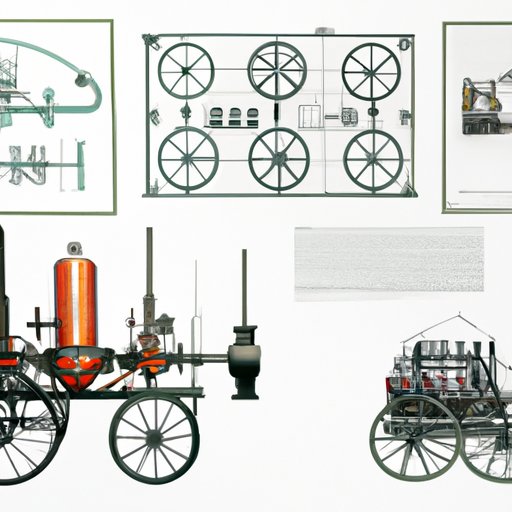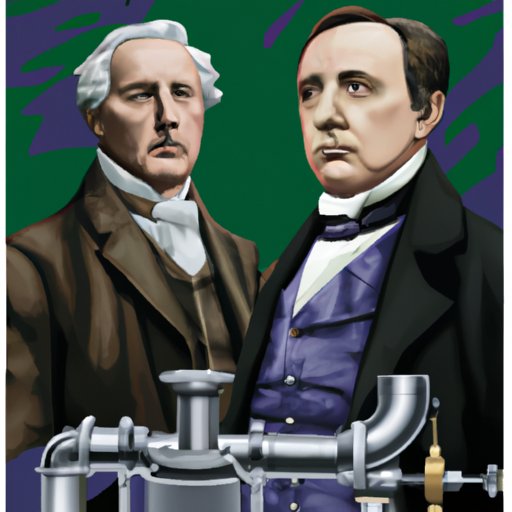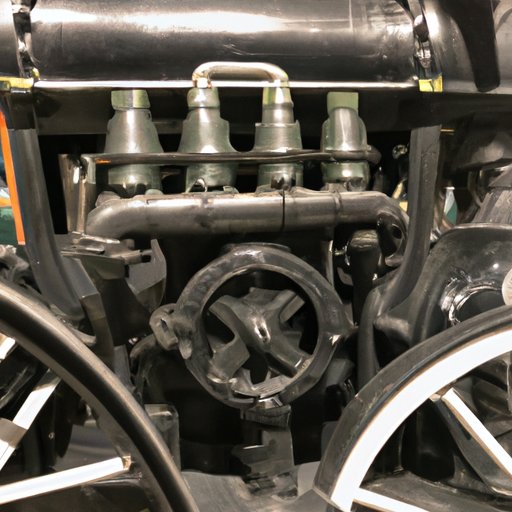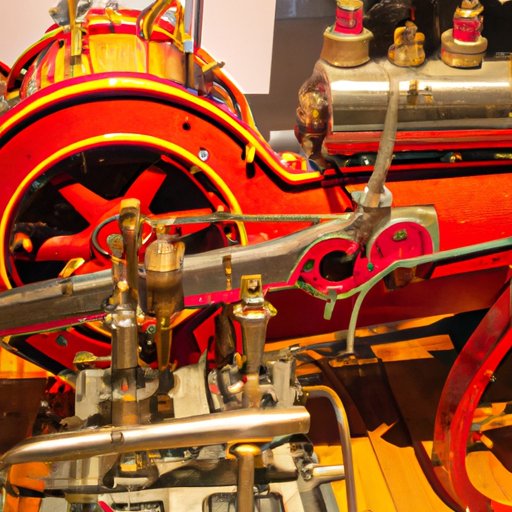Introduction
An engine is a machine that converts energy into mechanical power. It can be powered by a variety of sources such as steam, electricity, gasoline, or diesel fuel. The invention of the engine has been instrumental in shaping the world we live in today, revolutionizing transportation and expanding access to goods and services around the globe. In this article, we will explore the history of the engine, from its earliest forms to its modern day applications, as well as examining the inventors and innovators who helped to make it possible.

A Historical Overview of the Invention of the Engine
The concept of an engine dates back to antiquity, with early examples of water clocks, windmills and other simple machines being used for various purposes. In the 17th century, Thomas Savery invented the first steam engine, which was used primarily for pumping water from mines and other locations. By the 19th century, steam engines had become more powerful and efficient, and were used to power locomotives and ships.
In 1859, Jean Joseph Étienne Lenoir patented the first internal combustion engine, which used a spark plug to ignite a mixture of air and fuel. This type of engine would eventually become the standard for automobiles and other motorized vehicles. In 1876, Nikolaus Otto developed the four-stroke cycle internal combustion engine, which is still used in most modern cars today. And in 1908, Charles Kettering invented the electric starter motor, which made it easier to start cars without having to use a hand crank.

The Inventors Who Pioneered the Creation of Engines
Throughout history, there have been a number of inventors who have contributed to the development of the engine and its many applications. James Watt is credited with the invention of the steam engine in the late 18th century. His work led to the development of the steam locomotive, which revolutionized transportation by making it faster and more reliable.
Nikolaus Otto is widely regarded as the father of the four-stroke internal combustion engine. He spent years experimenting with different designs before finally settling on the four-stroke cycle, which is still used in most modern cars today. Charles Kettering is credited with inventing the electric starter motor, which made it easier to start cars without having to use a hand crank.

How the Engine Revolutionized Transportation
The invention of the engine fundamentally changed the way people traveled. Before the invention of the engine, most transportation was done by horse-drawn carriages or wagons. With the invention of the steam engine, locomotives were able to travel much farther and faster than ever before. This allowed for the rapid expansion of cities and towns across the country.
The internal combustion engine further revolutionized transportation. Automobiles became increasingly popular throughout the 20th century, and by the 1950s, they had become a staple of everyday life. The invention of the jet engine enabled aircraft to travel faster and farther than ever before, and space exploration became a reality with the invention of rocket engines.
A Timeline of Major Developments in Engine Technology
1712 – Thomas Newcomen patents a steam-powered pump, which becomes the precursor to the modern steam engine.
1859 – Jean Joseph Étienne Lenoir patents the first internal combustion engine, which uses a spark plug to ignite a mixture of air and fuel.
1876 – Nicolaus Otto develops the four-stroke cycle internal combustion engine, which is still used in most modern cars today.
1908 – Charles Kettering invents the electric starter motor, which makes it easier to start cars without using a hand crank.
Today – Electric and hybrid vehicles are becoming increasingly popular, as advances in battery technology make them more efficient and cost-effective.
Innovations in Engine Design Through the Ages
Over the years, engineers and designers have made numerous improvements to engine design and technology. Efficiency improvements have allowed engines to produce more power while using less fuel. Fuel economy advancements have made engines more economical to operate. And emission reduction technologies have helped to reduce the environmental impact of vehicle emissions.
Exploring the Impact of the Engine on Society
The invention of the engine has had a profound impact on society. Increased access to transportation has allowed people to travel further and faster than ever before, opening up new opportunities for business, leisure, and exploration. Improved quality of life is another benefit of the engine, as it has allowed people to access goods and services that would otherwise be out of reach.
At the same time, there are some environmental concerns associated with engine technology. Vehicle emissions are a major source of air pollution, which can lead to a variety of health problems. There is also the risk of oil spills and other accidents that can cause serious damage to the environment.

Examining the Future of Engine Technology
Engine technology is constantly evolving, and the future holds some exciting possibilities. Autonomous vehicle technology is being developed, which could revolutionize transportation by allowing cars to drive themselves. Renewable energy sources such as solar and wind power are being explored, which could reduce reliance on fossil fuels and lead to cleaner, more efficient engines. Advances in artificial intelligence could also lead to smarter, more efficient engines.
Conclusion
The invention of the engine has had a profound impact on our lives. From its earliest forms in antiquity to its modern day applications, the engine has revolutionized transportation and opened up new opportunities for exploration and discovery. In this article, we explored the history of the engine, the inventors who pioneered its creation, and the innovations that have shaped its evolution. We also examined the impact of the engine on society, and discussed the potential implications of future developments in engine technology.
(Note: Is this article not meeting your expectations? Do you have knowledge or insights to share? Unlock new opportunities and expand your reach by joining our authors team. Click Registration to join us and share your expertise with our readers.)
